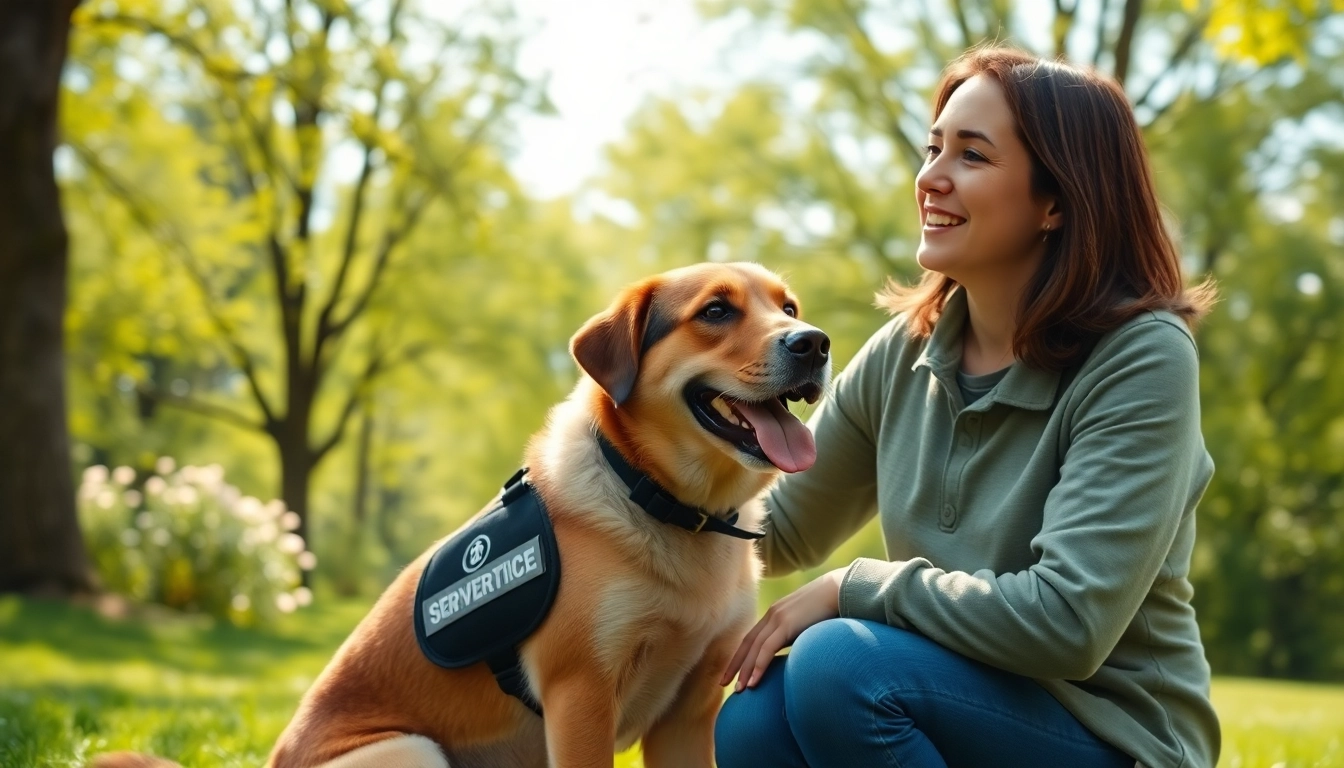The Importance of Psychiatric Service Dogs
Psychiatric service dogs play an essential role in providing support and assistance to individuals with mental health challenges. These specially trained dogs can help mitigate the effects of various psychiatric conditions, enhancing the quality of life for their handlers. A deeper understanding of the role and mechanisms of these animals can empower individuals seeking solutions for their mental health through these remarkable companions. The services and support that psychiatric service dogs can provide contribute significantly to the day-to-day life of their owners, offering both emotional support and practical help. If you’re considering bringing a psychiatric service dog into your life, you may want to explore psychiatric service dogs available for assistance.
What Are Psychiatric Service Dogs?
Psychiatric service dogs (PSDs) are defined as dogs that have been individually trained to perform tasks that aid individuals with psychiatric disabilities. Unlike emotional support animals, which offer companionship but are not trained for specific tasks, psychiatric service dogs have specialized skills tailored to their handlers’ needs. They follow a defined task list that may include behaviors designed to reduce anxiety, facilitate coping strategies, and minimize the impact of psychiatric symptoms ont he handler’s daily activities.
These dogs can be equipped to perform tasks such as providing deep pressure therapy during panic attacks, reminding their handlers to take medication, or even making physical contact in social situations to help ground the person and prevent overwhelming anxiety. Their training encourages autonomy and helps individuals learn to better manage their symptoms without relying solely on medication or therapy.
How Do Psychiatric Service Dogs Help?
The benefits of having a psychiatric service dog are manifold. These animals are not just companions; they are trained helpers designed to enhance the quality of life for individuals suffering from various mental health conditions. Below are some of the most common ways in which psychiatric service dogs provide support:
- Alleviating Anxiety: For individuals with generalized anxiety disorder, social anxiety, or panic disorder, a psychiatric service dog can provide grounding during anxious episodes through physical touch or by encouraging the person to engage in a more tranquil behavior.
- Support During PTSD Episodes: Veterans and survivors of trauma often benefit from psychiatric service dogs that can sense emotional distress and intervene with specific behaviors to reclaim safety and stability.
- Increasing Independence: By providing reminders for medications or alerting their handler to crucial tasks (like attending a therapy appointment), PSDs foster a sense of independence and self-efficacy.
- Detecting Anxiety Attacks: Some well-trained dogs can detect early signs of anxiety attacks and intervene through comforting touching or redirecting their handler’s attention.
Legal Recognition of Psychiatric Service Dogs
The Americans with Disabilities Act (ADA) recognizes psychiatric service dogs as legitimate service animals, granting them the same rights as guide dogs or service dogs for physical disabilities. This recognition is crucial as it allows handlers to bring their PSDs into public spaces, including restaurants, stores, and on public transport. However, it is essential to understand local and state guidelines, as some states may have additional regulations or definitions regarding service animals.
Choosing the Right Psychiatric Service Dog
Selecting the suitable psychiatric service dog is a critical step in ensuring that the animal will meet the specific needs of the handler. Not every dog will be appropriate for every individual, and several factors must be considered to facilitate a proper match.
Factors to Consider When Selecting a Dog
- Temperament: The dog should possess a calm temperament, as high-energy or anxious dogs may not provide the soothing presence needed by their handlers.
- Size: Depending on the handler’s ability to physically manage the dog, size may become a crucial consideration. Both small lap dogs and larger breeds can serve effectively as psychiatric service dogs.
- Age: Puppies require extensive training and may not be suitable for someone in immediate need. Conversely, older dogs may have experience and temperament that aligns with the handler’s needs.
- Health: It is necessary to consider the overall health and any potential hereditary health concerns in the breed. Those issues can affect a dog’s ability to perform as a psychiatric service dog over time.
Popular Breeds for Psychiatric Service Dogs
While any dog can technically be trained to be a psychiatric service dog, certain breeds are frequently selected due to their traits and personalities. Here are some popular choices:
- Golden Retrievers: Known for their friendly and gentle nature, they are highly trainable and often excel in service roles.
- Labrador Retrievers: This breed is similarly known for its intelligence and ability to adapt to various tasks.
- Poodles: Hypoallergenic and highly trainable, poodles can be an excellent choice for individuals with allergies.
- Boxers: Affectionate and energetic, boxers can provide companionship in a joyful manner, though they require regular exercise to stay well-adjusted.
Finding a Reputable Source for Psychiatric Service Dogs
When looking for a psychiatric service dog, it is crucial to find a reputable source that prioritizes the health and training of the dogs. Look for organizations or breeders who specialize in training service animals. They should provide a transparent training process and have reliable references. Additionally, potential owners should avoid “puppy mills” which often produce poorly bred dogs lacking in temperament, health, and training capabilities.
Training for Psychiatric Service Dogs
The training process for psychiatric service dogs is crucial in ensuring that the dog can effectively support the handler’s needs. This process involves teaching the dog specific commands, behaviors, and tasks that assist with the handler’s mental health condition.
Overview of Training Required
Training for psychiatric service dogs typically includes the following stages:
- Basic Obedience: Initially, the dog must master basic commands, such as sit, stay, come, and heel. Solid obedience is vital for ensuring the dog can be controlled in public environments.
- Socialization: The dog should be socialized to various environments, people, and other animals to reduce the risk of fear-reactivity and foster adaptability.
- Task Training: The focus here is on teaching specific tasks that will benefit the handler, like fetching medications, creating space in crowded areas, or turning on lights during episodes of distress.
Specific Tasks Psychiatric Service Dogs Can Perform
Psychiatric service dogs can be trained to perform an array of tasks that are tailored specifically to assist individuals with mental health conditions. Some commonly trained tasks include:
- Deep Pressure Therapy: Dogs can be trained to provide calming pressure, resting against or on the handler’s body during anxiety attacks.
- Medication Alerts: PSDs can remind handlers to take medications at the appropriate times, which is particularly important for people with mood disorders or PTSD.
- Grounding Techniques: Dogs can be trained to distract or ground their handler during episodes of dissociation or panic.
- Leading/Armed During Episodes: During distressing episodes, dogs can be trained to lead their handlers safely out of overwhelming situations or alert others nearby for assistance.
Certification Process for Psychiatric Service Dogs
The certification process for psychiatric service dogs varies depending on local laws and guidelines. While the ADA does not require service dogs to be certified, having documentation that outlines the dog’s training and tasks can help facilitate acceptance in public settings. This can include a letter from a licensed therapist or mental health professional confirming the need for a service animal due to the handler’s condition. Additionally, engaging with organizations that specialize in service dog training can assist in legitimizing the team of handler and dog.
Coping with Challenges While Using Psychiatric Service Dogs
While psychiatric service dogs provide immense help for their handlers, challenges can arise. Understanding these challenges and strategizing solutions is vital for maximizing the benefits that the dogs offer.
Addressing Public Perception and Misunderstandings
One of the significant challenges faced by handlers of psychiatric service dogs is public perception. Many people may misunderstand the role and rights of these animals, often assuming they are merely pets. To navigate this, handlers should stay informed about their rights under the ADA and be prepared to educate others about the true purpose of psychiatric service dogs. Carrying documentation that outlines the dog’s role may also help facilitate smoother interactions in public spaces.
Maintaining the Dog’s Well-Being
Like any other working animal, psychiatric service dogs require proper care and attention to thrive. This includes regular veterinary check-ups, balanced nutrition, and mental stimulation. Handlers must also be mindful of their dog’s emotional health, as the stress of their job can impact the PSD’s well-being. Engaging in regular playtime, social activities, and downtime are vital components to ensure both the handler’s and the dog’s mental health remain balanced.
Managing Expectations from Psychiatric Service Dogs
It is essential for handlers to have realistic expectations regarding their psychiatric service dog’s capabilities. These dogs can assist significantly but are not a cure-all for psychiatric conditions. They are not a replacement for therapy or medication. Educating oneself about the limitations of service animals can help manage expectations and avoid potential disappointments.
Resources and Support for Owners of Psychiatric Service Dogs
Having a psychiatric service dog can be a life-altering experience, and support systems are crucial for both the handler and their canine companion. Various resources can assist owners in navigating life with a psychiatric service dog.
Organizations Supporting Psychiatric Service Dogs
Several organizations are dedicated to supporting individuals with psychiatric service dogs. They offer resources, advocacy, and information on best practices for training and handling service dogs. These organizations aim to raise awareness and provide community support for handlers facing common challenges.
Online Communities for Owners
The internet provides a platform for connection among psychiatric service dog owners. Online forums, social media groups, and chat rooms spotlight shared experiences, allowing community members to exchange tips, resources, and emotional support. Participating in these communities can help create a sense of belonging and provide opportunities for learning from the experiences of others.
Educational Materials on Psychiatric Service Dogs
Countless resources are available for individuals considering adopting, training, or enhancing their experience with a psychiatric service dog. Books, online courses, and reputable websites offer invaluable information on best practices, training techniques, and real-life experiences, equipping handlers with the knowledge they need to succeed.



